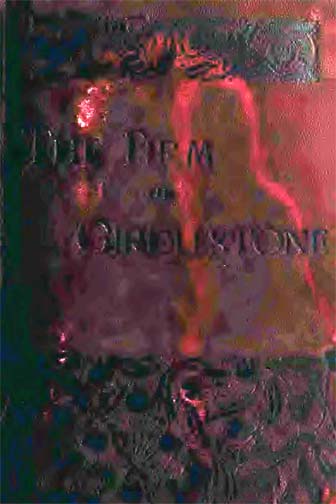
Ezra Girdlestone had taken up his quarters in two private rooms at the Central Hotel, Kimberley, and had already gained a considerable reputation in the town by the engaging “abandon” of his manners, and by the munificent style in which he entertained the more prominent citizens of the little capital. His personal qualities of strength and beauty had also won him the respect which physical gifts usually command in primitive communities, and the smart young Londoner attracted custom to himself among the diggers in a way which excited the jealousy of the whole tribe of elderly Hebrews who had hitherto enjoyed a monopoly of the trade. Thus, he had already gained his object in making himself known, and his name was a familiar one in every camp from Waldeck’s Plant to Cawood’s Hope. Keeping his headquarters at Kimberley, he travelled perpetually along the line of the diggings. All the time he was chafing secretly and marvelling within himself how it was that no whisper of the expected news had arrived yet from England.
One sunny day he had returned from a long ride, and, having dined, strolled out into the streets, Panama hat upon head and cigar in mouth. It was the 23rd of October, and he had been nearly ten weeks in the colony. Since his arrival he had taken to growing a beard. Otherwise, he was much as we have seen him in London, save that a ruddier glow of health shone upon his sunburned face. The life of the diggings appeared to agree with him.
As he turned down Stockdale Street, a man passed him leading a pair of horses tired and dusty, with many a strap and buckle hanging down behind them. After him came another leading a second pair, and after him another with a third. They were taking them round to the stables. “Hullo!” cried Ezra, with sudden interest; “what’s up?”
“The mail’s just in.”
“Mail from Capetown?”
“Yes.”
Ezra quickened his pace and strode down Stockdale Street into the Main Street, which, as the name implies, is the chief thoroughfare of Kimberley. He came out close to the office of the Vaal River Advertiser and Diamond Field Gazette. There was a crowd in front of the door. This Vaal River Advertiser was a badly conducted newspaper, badly printed upon bad paper, but selling at sixpence a copy, and charging from seven shillings and sixpence to a pound for the insertion of an advertisement. It was edited at present by a certain P. Hector O’Flaherty, who having been successively a dentist, a clerk, a provision merchant, an engineer, and a sign painter, and having failed at each and every one of these employments, had taken to running a newspaper as an easy and profitable occupation. Indeed, as managed by Mr. O’Flaherty, the process was simplicity itself. Having secured by the Monday’s mail copies of the London papers of two months before, he spent Tuesday in cutting extracts from them with the greatest impartiality, chopping away everything which might be of value to him. The Wednesday was occupied in cursing at three black boys who helped to put up the type, and on the Thursday a fresh number of the Vaal River Advertiser and Diamond Field Gazette was given to the world. The remaining three days were devoted by Mr. O’Flaherty to intoxication, but the Monday brought him back once more to soda water and literature.
It was seldom, indeed, that the Advertiser aroused interest enough to cause any one to assemble round the Office. Ezra’s heart gave a quick flutter at the sight, and he gathered himself together like a runner who sees his goal in view. Throwing away his cigar, he hurried on ad joined the little crowd.
“What’s the row?” he asked.
“There’s news come by the mail,” said one or two bystanders.
“Big news.”
“What sort of news?”
“Don’t know yet.”
“Who said there was news?”
“Driver.”
“Where is he?”
“Don’t know.”
“Who will know about it?”
“O’Flaherty.”
Here there was a general shout from the crowd for O’Flaherty, and an irascible-looking man, with a red bloated face and bristling hair came to the office door.
“Now, what the divil d’ye want?” he roared, shaking a quill pen at the crowd. “What are ye after at all? Have ye nothing betther to do than to block up the door of a decent office?”
“What’s the news?” cried a dozen voices.
“The news, is it?” roared O’Flaherty, more angrily than ever; “and can’t ye foind out that by paying your sixpences like men, and taking the Advertoiser? It’s a paper, though Oi says it as shouldn’t, that would cut out some o’ these Telegraphs and Chronicles if it was only in London. Begad, instead of encouraging local talent ye spind your toime standing around in the strate, and trying to suck a man’s news out of him for nothing.”

